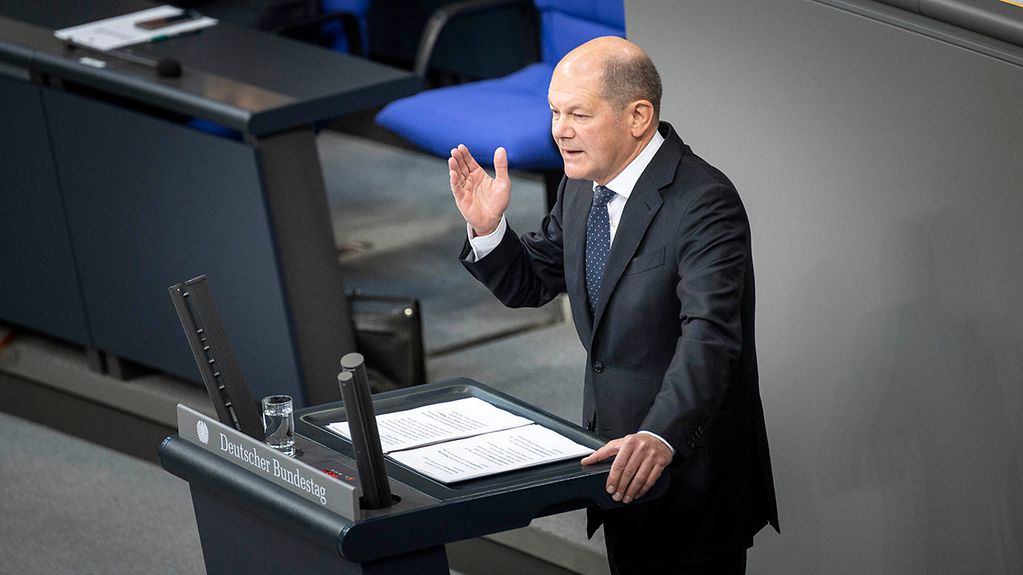The Federal Chancellor’s budget speech
“This Federal Government doesn’t just talk, it takes action” – through reforms, relief measures, its energy and security policy. Federal Chancellor Scholz used his budget speech as an opportunity to take stock of government policy in recent months. He said that Germany had the crisis under control.

Federal Chancellor Olaf Scholz giving his budget speech in the Bundestag.
Photo: Bundesregierung/Bergmann
Progress, awakening and renewal were the goals of the Federal Government, said Federal Chancellor Scholz in his speech in the Bundestag: “Our country needs change, it is not an option to carry on as before.” He pointed out that inactivity comes at a high cost, and that it was therefore a vital task to prepare the country for the future. Germany was already crisis-proof and fully prepared for the winter, Scholz said. “Thanks to its citizens’ vigour and adaptability – and thanks to the work of this Federal Government,” the Federal Chancellor stressed.
Sticking together despite numerous challenges
The Federal Government was modernising transport policy, investing in digitalisation, combating the lack of skilled workers, modernising immigration law and attaching greater importance to housing construction, Scholz said. He added that two percent of Germany’s economic output was being spent on restoring the efficiency of the Federal Armed Forces. “And through all of this we are keeping our country together – and are not leaving anyone behind,” Federal Chancellor Scholz emphasised.
Providing relief for people in Germany
“In our first eleven months we got close to 100 laws off the ground,” Scholz said, explaining that these included relief packages, as well as the gas, heat and electricity brakes for households and companies. They also included an inflation compensation law based on which 48 million citizens were paying considerably lower taxes, he said, adding that a family with two children and a gross household income of 56,000 euros would be taking home an extra 1,130 euros next year. “We are implementing relief measures,” Scholz stressed in his speech and continued saying that the state was making sure that people’s efforts were paying off and that millions of citizens in Germany would make it through the crisis on their own.
Working to make a decent living
“Out citizens want to work – and they want to make a decent living out of their work,” Scholz said. “This is why right from the start our policy focused on those who roll up their sleeves to keep things going, who get up in the morning and go to work.” Scholz mentioned consultation, vocational training and further education and less bureaucracy as key components of the citizen’s income reform. He said that it was all about ways to escape long-term unemployment, and to move beyond casual labour and enter the employment market. Scholz pointed out that this was why it had been important to raise the minimum wage to twelve euros. In addition, all those who earn less than 2,000 euros a month would be paying less in social security from January, Scholz reported.
The future of energy supply
“A year ago, our energy storage facilities were unusually empty, now they are filled to the brim. This is the case because this Federal Government doesn’t just talk, it takes action,” the Federal Chancellor stressed. Germany was freeing itself of its one-sided dependence on Russia and China with regard to energy and trade, Scholz said. He added that LNG terminals, new delivery contracts, re-starting coal-fired power stations and continued operation of the nuclear power stations were helpful in the current situation. The blockages that had been slowing down the energy and climate transition for many years were being removed, and renewable energies and the required transmission grids were being expanded much faster than before, Scholz reported. For the first time, renewable energies had covered half of Germany’s electricity consumption in the first half of this year, Scholz said: “We are going in the right direction.” The future of our energy supply belonged to wind power, solar energy and green hydrogen, he pointed out.
Stopping the war and advancing Europe
“Russia must stop this war at last,” Scholz demanded, adding that the clear signals from the G20 Summit had been essential. “Any threat related to nuclear weapons is completely unacceptable for all of us, their use will not be tolerated,” the Federal Chancellor said. Germany had supplied weapons to Ukraine and would continue to provide support side by side with its allies, he noted.
Scholz went on to say that with regard to European policy, the Federal Government had drawn up clear ideas, and that it was cooperating with France to make Europe more capable of action with regard to geopolitical issues. The Federal Government had opened up the prospect of a European future for Ukraine, Moldova and Georgia and given momentum to the accession process with the Western Balkan states, Scholz pointed out. He added that the Federal Government’s European policy was bringing Europe closer together and that this was “good for our country”.